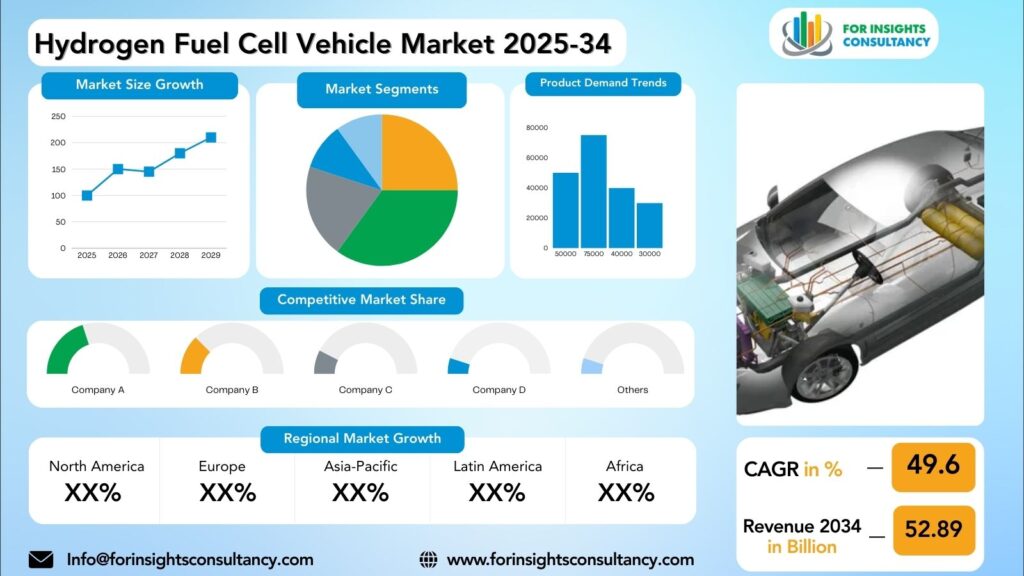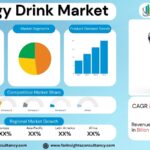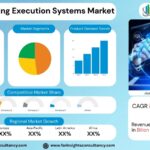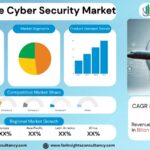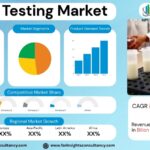
Hydrogen Fuel Cell Vehicle Market Research Report By Technology (Proton Exchange Membrane Fuel Cell (PEMFC),Other Fuel Cell Types)), By Vehicle Type (Commercial Vehicles, Passenger Vehicles), By Operating Range (Less than 250 Miles, 251-500 Miles, Above 500 Miles), By Power Output (Less than 100 kW, 100-200 kW, More than 200 kW), And by End-Use Ownership, and Region Global Market Analysis and Forecast, 2025-2034
Aug-2025 Formats | PDF | Category: Automotive | Delivery: 24 to 72 Hours
Hydrogen Fuel Cell Vehicle Market is forecast to increase from USD 1.4 billion in 2025 to USD 52.89 billion by 2034, at a CAGR of 49.6%.
Hydrogen Fuel Cell Vehicle Market: A Comprehensive Overview and Future Developments
Hydrogen fuel cell vehicles are gaining popularity as a cleaner and more sustainable alternative to traditional gasoline-powered cars. These vehicles use hydrogen as fuel, which is converted into electricity through a chemical process in the fuel cell, powering the vehicle’s electric motor and emitting only water vapor and heat as by products. As governments worldwide strive to reduce carbon emissions and combat climate change, hydrogen fuel cell vehicles have emerged as a promising solution.
The hydrogen fuel cell vehicle market has been steadily growing, with major automakers like Toyota, Honda, and Hyundai introducing these vehicles to consumers. Governments are incentivizing the adoption of hydrogen fuel cell vehicles through subsidies, tax breaks, and infrastructure investments. The future of the hydrogen fuel cell vehicle market is promising, with ongoing research and development efforts expected to lead to improvements in cost reductions, infrastructure expansion, and performance enhancements. The potential integration of hydrogen fuel cell technology into other sectors, such as energy storage and stationary power generation, opens up new opportunities for growth and innovation in the hydrogen economy.
Hydrogen Fuel Cell Vehicle Market Dynamics
Growth Drivers
The hydrogen fuel cell vehicle market is driven by significant technological advancements, environmental awareness, government support, and infrastructure development. Manufacturers are investing in research and development to improve fuel cell vehicle performance and efficiency, making them more competitive with traditional internal combustion engine vehicles. This has led to longer driving ranges, shorter refueling times, and increased durability of fuel cell systems. Environmental awareness is another key driver of the market growth. With concerns about climate change and air pollution, consumers are seeking cleaner, more sustainable transportation options. Hydrogen fuel cell vehicles produce zero emissions, emitting only water vapor and heat as byproducts.
Government support and incentives, such as tax credits, rebates, and infrastructure investments, have played a significant role in driving the growth of the hydrogen fuel cell vehicle market. Governments, automakers, and energy companies are working together to expand the hydrogen refueling network, paving the way for greater adoption of hydrogen fuel cell vehicles. Cost reduction is another driving factor in the market. As technology advances and economies of scale are achieved, the cost of hydrogen fuel cell vehicles is decreasing, making them more affordable for consumers. Manufacturers are working to further reduce the cost of fuel cell vehicles, making them a more competitive option in the automotive industry.
Restraints
The high cost of hydrogen fuel cell vehicles is a major barrier to widespread adoption. The technology behind fuel cells and hydrogen storage is still expensive, making them inaccessible to the average consumer. The lack of infrastructure, particularly in hydrogen refueling stations, is another significant challenge. Unlike traditional gasoline-powered vehicles, hydrogen fuel cell vehicles require a network of stations for long-distance travel. Currently, the infrastructure for hydrogen refueling is limited, primarily located in urban areas. This lack of a comprehensive and reliable refueling infrastructure may discourage drivers from switching to hydrogen fuel cell vehicles.
The availability of hydrogen fuel cell vehicles is another constraint. Major automakers like Toyota, Hyundai, and Honda have introduced fuel cell models, but production and distribution are still limited compared to conventional gasoline cars. As production ramps up, consumer awareness and acceptance of hydrogen fuel cell vehicles are expected to increase.
Efficient energy storage and utilization of hydrogen remain major challenges in the development of hydrogen fuel cell vehicles. Safe and effective storage in onboard tanks and efficient conversion of hydrogen into electricity through fuel cells require ongoing research and innovation.
Opportunity
Hydrogen fuel cell vehicles offer environmental benefits, producing zero emissions and providing longer driving ranges and shorter refueling times compared to electric vehicles. The growing demand presents opportunities for industry players, including automakers, fuel cell manufacturers, and hydrogen infrastructure providers, to invest in research, expand product offerings, and collaborate with government agencies to promote hydrogen fuel cell technology.
Challenges
The hydrogen fuel cell vehicle market faces significant challenges due to high production costs, making them less accessible to consumers. Additionally, there is a lack of infrastructure to support hydrogen fuel cell vehicles, such as refueling stations and production facilities. To address this, manufacturers must scale up production through technological advancements and economies of scale, investing in research and development to improve efficiency. Government incentives and subsidies can also make hydrogen fuel cell vehicles more affordable for consumers. Governments and private companies must collaborate to build a network of hydrogen refueling stations and production facilities, requiring coordination and cooperation at both local and national levels. This will ensure the necessary infrastructure is in place to support the growth of the hydrogen fuel cell vehicle market.
Hydrogen Fuel Cell Vehicle Market Top Companies Covered In This Report:
Evaluate The Strategic Positioning And Innovation Pipelines Of Leading Market Companies-From Multinational Enterprises To Disruptive Regional Firms. Understand How Key Players Are Innovating, Expanding, And Capturing Value, And Use Competitive Benchmarks To Plan Your Next Move.
- Toyota Motor Corporation
- Hyundai Group
- Honda
- General Motors
- Stellantis
- Ballard Power System
- ITM Power
- Plug Power
- Delphi Technologies
Hydrogen Fuel Cell Vehicle Market News
2025 News
Hyundai Motor Company: At major events like the World Congress of the Econometric Society, Hyundai showcased its hydrogen mobility vision. A key highlight was the unveiling of the all-new NEXO, a redesigned fuel cell electric vehicle (FCEV) with an enhanced powertrain, improved efficiency, and a targeted range of over 700 kilometers. Hyundai also emphasized its commitment to commercial vehicles, showcasing its hydrogen-powered trucks and buses.
Nikola Corporation: In a major development, Nikola, a prominent hydrogen truck manufacturer, faced bankruptcy. This led to a large-scale auction of its hydrogen trucks. Hyroad Energy, a U.S. company, acquired 113 of Nikola’s hydrogen fuel cell trucks and related assets. This acquisition will allow Hyroad to rapidly expand its zero-emission fleet, particularly in California, highlighting the continued demand for hydrogen trucking even amidst the financial struggles of some manufacturers.
2024 News
June 11, 2024 Honda Advances Hydrogen Strategy with Production Launch of Fuel Cell Electric Vehicle in Ohio
Honda celebrated the start of production of the all-new 2025 Honda CR-V e:FCEV fuel cell electric vehicle (FCEV) at the Performance Manufacturing Center (PMC) in Ohio. The all-new CR-V e:FCEV is the only FCEV made in America, as well as the first production1 hydrogen FCEV in the United States to combine an all-new U.S.-made fuel cell system with plug-in EV charging capability. A fun-to-drive compact CUV, the CR-V e:FCEV received a 270-mile EPA driving range rating, combining the fuel cell system with plug-in charging to provide up to 29 miles2 of EV driving around town with the flexibility of fast hydrogen refueling for longer trips.
Toyota and BMW: The two automotive giants deepened their long-standing partnership, with a focus on co-developing next-generation fuel cell systems. This collaboration aims to leverage combined expertise and economies of scale to bring hydrogen vehicles to mass production, with a planned launch of a series-production hydrogen vehicle in 2028.
Segmented View of the Industry:
The Hydrogen Fuel Cell Vehicle Market Is Mapped Through A Multidimensional Lens-Tracking Shifts Across Product Type, Applications, And Geographic Regions. This Segmented Approach Enables Businesses To Localize Their Growth Plans And Align Offerings With The Most Profitable Demand Centers.
Segmentation by Technology
- Proton Exchange Membrane Fuel Cell (PEMFC)
- Other Fuel Cell Types
Segmentation by Vehicle Type
- Commercial Vehicles
- Passenger Vehicles
Segmentation by Operating Range
- Less than 100 kW
- 100-200 kW
- More than 200 kW
Segmentation by End-Use Ownership
- Private/Personal
- Commercial Fleets
Global Geographic Coverage:
The Report Provides In-Depth Qualitative and Quantitative Data On the Hydrogen Fuel Cell Vehicle Market For All Of The Regions And Countries Listed Below:
North America
North America is a major player in the hydrogen fuel cell vehicle market, with the US and Canada leading in infrastructure development and adoption. Key states like California and New York have set ambitious zero-emission vehicle mandates, driving demand for these vehicles. California aims to have 1.5 million zero-emission vehicles on its roads by 2025, creating a strong market for hydrogen fuel cell vehicles. Canada’s government has also promoted the adoption of hydrogen fuel cell vehicles, offering incentives and subsidies to consumers and manufacturers. The country’s abundant renewable energy resources make hydrogen fuel cell vehicles an attractive option for sustainable transportation. With strong government support and a growing network of refueling stations, hydrogen fuel cell vehicles are poised to play a significant role in the transportation sector.
Europe
Germany is leading the way in the adoption of hydrogen fuel cell vehicles due to robust government support and a well-established infrastructure. Major automakers like BMW and Mercedes-Benz are investing heavily in hydrogen technology, and Germany’s extensive network of refueling stations and incentives are paving the way for widespread adoption. The UK is also gaining traction in the hydrogen fuel cell vehicle market, driven by ambitious targets to reduce carbon emissions and promote sustainable transportation. Government grants and subsidies are encouraging consumers to switch to hydrogen-powered vehicles, while infrastructure development is expanding the refueling network. Leading automakers like Toyota and Hyundai are actively promoting their hydrogen fuel cell models in the UK market. France is another key player in the European hydrogen fuel cell vehicle market, focusing on clean mobility solutions. French automakers like Renault and PSA Group are investing in hydrogen technology, positioning France as a hub for innovation in sustainable transportation. Spain is also making significant strides in the adoption of hydrogen fuel cell vehicles, driven by growing awareness of decarbonization and a shift towards clean energy. Italy is also embracing hydrogen fuel cell vehicles as part of its commitment to reducing greenhouse gas emissions and promoting sustainable transport solutions.
Asia Pacific
Japan, South Korea, China, and Australia are major players in the hydrogen fuel cell vehicle market. Japan has been a pioneer in the development and adoption of hydrogen vehicles, investing heavily in infrastructure and leading automakers like Toyota. South Korea’s ambitious targets for fuel cell vehicle adoption, including Hyundai, are incentivizing consumers and automakers to embrace this technology. China, with its massive population and growing demand for clean transportation options, is a key market for hydrogen fuel cell vehicles. The government is actively promoting fuel cell vehicle adoption to reduce air pollution and dependence on fossil fuels. Domestic automakers like BYD and Geely are investing in fuel cell technology. Australia, despite being a smaller market compared to Japan and China, is an important player in the Asia Pacific region due to its abundant renewable energy resources. Initiatives like the National Hydrogen Strategy aim to promote the growth of the hydrogen economy, making Australia a key player in the global market.
Middle East and Africa
Middle East countries like the UAE and Saudi Arabia are embracing hydrogen fuel cell technology due to their abundant sunlight and desert landscapes. UAE aims to increase its share of clean energy in its transportation sector by investing in hydrogen infrastructure and partnering with leading automakers. Meanwhile, countries like South Africa and Morocco are promoting hydrogen fuel cell technology to reduce carbon emissions and increase energy security. South Africa, with its rich platinum reserves, is well-positioned to become a major player in the global hydrogen economy. By leveraging its natural resources and investing in research and development, South Africa is paving the way for a hydrogen-powered future.
Reasons to Buy:
- The Research Would Help Top Administration/Policymakers/Professionals/Product Advancements/Sales Managers And Stakeholders In This Market In The Following Ways.
- The Report Provides Hydrogen Fuel Cell Vehicle Market Revenues At The Worldwide, Regional, And Country Levels With A Complete Analysis To 2034 Permitting Companies To Analyze Their Market Share And Analyze Projections, And Find New Markets To Aim For.
- To Understand The Most Affecting Driving And Restraining Forces In The Market And Their Impact On The Global Market.
- Major Changes And Assessment In Market Dynamics And Developments.
- The Objective Of The Hydrogen Fuel Cell Vehicle Market Report Is To Identify New Business Opportunities Using Quantitative Market Forecasts.
- Formulate Sales And Marketing Strategies By Gaining An Understanding Of Competitors, Their Positioning, And Strengths & Weaknesses.
Faq – What Global Leaders Are Asking
What Is The Growth Prospect For The Hydrogen Fuel Cell Vehicle Market By 2034?
Hydrogen Fuel Cell Vehicle Market Is Expected To Achieve A Stable Growth Rate With A Compound Annual Growth Rate (Cagr) Of About 49.6% From 2025 Through 2034.
What Is Driving The Growth Of The Hydrogen Fuel Cell Vehicle Market?
The growth of the hydrogen fuel cell vehicle market is primarily driven by stringent government regulations and initiatives promoting zero-emission transportation to combat climate change. This is further fueled by the unique benefits of HFCVs, such as long driving range and rapid refueling times, which make them a compelling alternative to traditional vehicles, especially in the commercial sector.
Who Are The Key Players In The Hydrogen Fuel Cell Vehicle Market, And What Are Their Market Shares?
The Hydrogen Fuel Cell Vehicle Market Includes Major Companies Like Toyota Motor Corporation, Hyundai Group, Honda, General Motors, Stellantis, Ballard Power System, ITM Power, Plug Power, Delphi Technologies.
Specific Market Share Data Is Not Publicly Available and Is Typically Provided In Detailed, Proprietary Market Research Reports.
Which Regions Are Leading the Hydrogen Fuel Cell Vehicle Market Growth?
The Asia-Pacific region is the clear leader in the hydrogen fuel cell vehicle market, holding the largest market share due to aggressive government support and significant investments in hydrogen infrastructure. North America is also a key player, poised for the fastest growth with a high concentration of research and development and supportive policies.
Customization: We Can Provide Following Things
1) On Market More Company Profiles (Competitors)
2) Data About Particular Country Or Region
3) We Will Incorporate The Same With No Additional Cost (Post Conducting Feasibility).
Any Requirement Contact Us: Https://Www.Forinsightsconsultancy.Com/Contact-Us/
Table of Contents
For TOC Contact us: https://forinsightsconsultancy.com/contact-us/

